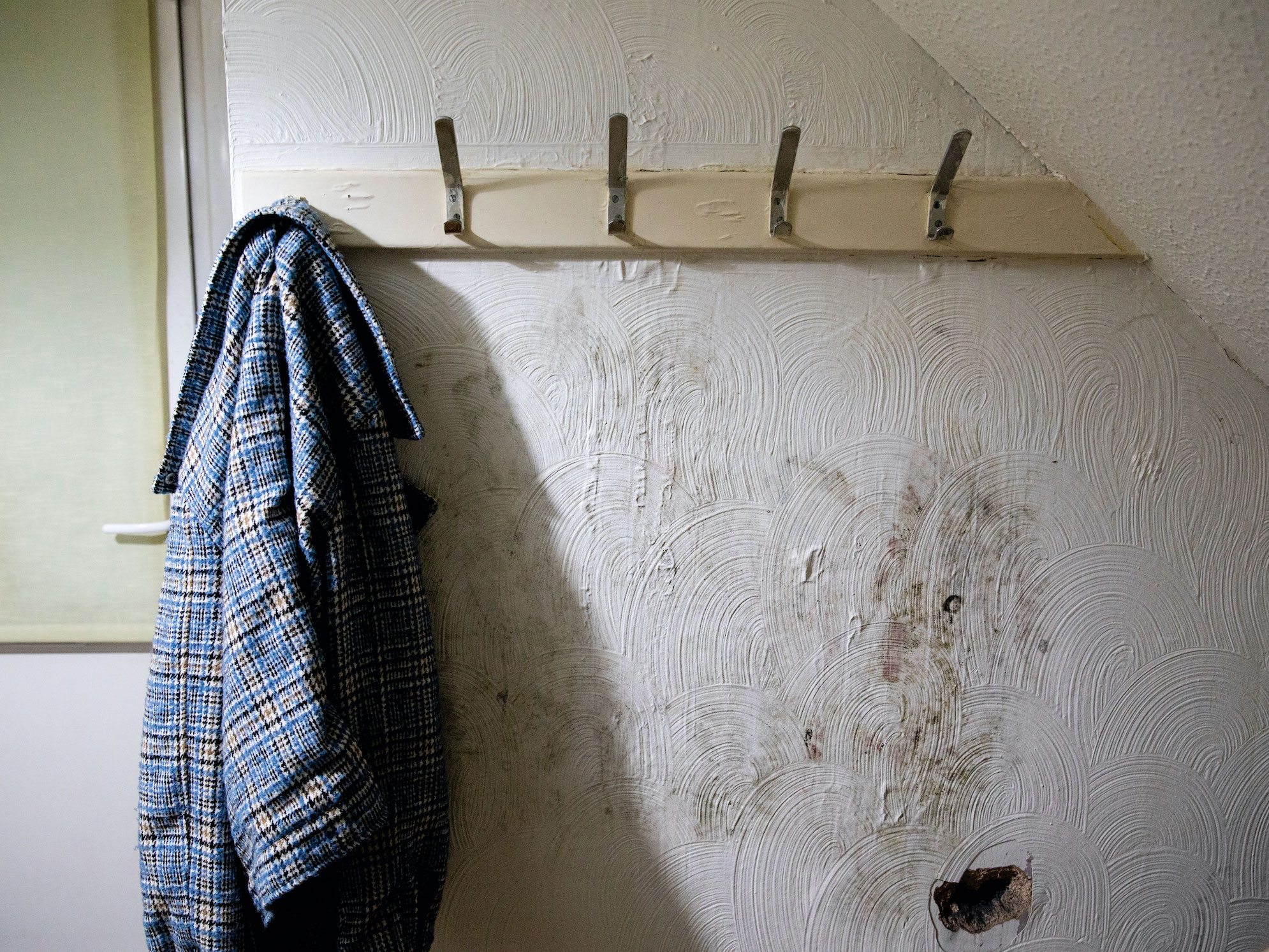The Kwajo Tweneboa interview: "We’re meant to be in 2023. This is like Victorian slum housing”
Housing campaigner Kwajo Tweneboa at his Eastfields estate flat in Mitcham (Photography by Louise Haywood-Schiefer)
11 min read
Kwajo Tweneboa was forced to become an activist after watching his father die in a flat that was not fit to live in. He tells Tali Fraser about the pressure he’s under as he fights for a good home for all – and why he feels let down by Labour.
At the bottom of the stairs in Kwajo Tweneboa’s flat there is a patch of mould where the coats should hang. It is where some of his father’s things had been hanging since he died from cancer in January 2020.
A few months ago Tweneboa, 24, went to take his father’s belongings down – they were some of the clothes he wore most and things that Tweneboa wanted to keep for himself – but as he lifted them off the hook he found that they were stuck to the wall. Peeling them off revealed the patch of mould on the wall that is staring at us now.
Not knowing it was there, the mould had spread and started to grow inside his father’s jackets, leaving them ruined. Tweneboa was forced to pack them up in bin bags and throw them away. His eyes well up: “They were his belongings, the stuff that I was going to keep since he passed. But I had to throw them out. I was really upset that day. I was really upset and angry because I was planning on keeping that stuff but I can’t because it is covered with mould, so I bagged it up and threw it out.”
 The patch of mould that spread onto his father's jackets
The patch of mould that spread onto his father's jackets
His father, Kwaku Robert Tweneboa, became terminally ill with stage 4 oesophageal cancer only 10 months after the family moved into their Eastfields estate flat in Mitcham, south London. The flat, which came under the housing association Clarion, the country’s largest, had issues that meant the Macmillan nurses caring for his father, struggled to do so, he says. Mice, flies, woodlice, cockroaches, mould, lights filled with water, a broken back door: “You name it.”
Tweneboa and his two sisters (he is the middle child) had lived with their father since they were children. Before moving to Eastfields, they had even been housed in a one-room converted garage where mould was growing on the beds, unable to afford a mortgage or private accommodation. Eastfields was meant to be a move in the right direction.
Instead, Tweneboa says he was forced to ask Clarion to make much-needed repairs for more than a year, with no success, before taking action into his own hands a year after his father’s death. In 2021 he posted pictures online of the dire conditions in his home, naming and shaming Clarion, which quickly went viral and hurried the housing association into action. It repaired the flat over the summer and issued an statement acknowledging the “inconvenience”, adding: “we... apologise if Mr Tweneboa feels we haven’t provided the service expected from us.”
But Tweneboa didn’t stop there: he turned his attention to his neighbour’s homes getting fixed, and has now extended his sights to the rest of the country. It has made him the UK’s most well-known housing activist, regularly appearing on TV, meeting with the secretary of state and hosting his own Channel 4 documentary, earning him the moniker “The Housing Hero”.
He is constantly busy, telling me that while he had wanted to get a haircut ahead of this interview he found himself taking too many phone calls from tenants. The longest call Tweneboa has ever taken from a tenant in distress lasted four hours. There are days when he has received up to 30 messages from people having trouble with their housing.
Some send him videos of their children, asleep, gasping for breath because of the damp, others where their children’s eczema is getting inflamed by the mould they are living in. The severity is terrifying.
He has been working to support the family of Awaab Ishak, the two-year-old boy who died from a respiratory condition caused by “extensive” mould in the one-bedroom flat where he lived. It has led to a new proposal from ministers for “Awaab’s Law” that would force social landlords to investigate and fix damp and mould in social housing within strict time limits.
While this is something Tweneboa welcomes, he struggles to believe it was allowed to get to this stage: “We’re meant to be living in 2023. This is like Victorian slum housing. You read information from back then of tenants complaining about their conditions, with sewage running through people’s homes. Well it is still happening!”

The conditions Tweneboa and his family dealt with clearly still haunt him. Although most of his issues have been sorted, living in a safe version of the home that was falling around him while his father was dying has left him in a state of paranoia where he thinks he can still hear mice scratching in the walls.
After all, it is not like the Eastfields estate’s issues have been solved. When visiting his neighbour across the road, he says he found a massive leak, a hole in the wall and mushrooms growing from the floor: “It’s still having issues, it’s still not fixed and these are organisations making hundreds of millions in surplus. If they wanted to they could invest a huge amount to fix the estate but that hasn’t happened. If they wanted to, they really could. That’s the problem. We’re not tough enough on these organisations at all.”
The housing conditions his family faced left him dealing with severe anxiety and depression: “After my dad passed away, and then with all of this on top [...] I remember just feeling completely empty. I rang my friend and I said: ‘I want to kill myself.’ Like I literally said to them: ‘I don’t want to be no more.’"
“I got to the state of planning things in my head. At the time, I wasn’t upset about it. I remember how I was feeling and it all felt very clear. I don’t know if that was grief from my dad but I just felt so empty, like I could just do this and not care. I don’t think I could ever feel as low as then.”
He says his mental health has recovered, but Tweneboa is now having to deal with people writing to him, threatening to kill themselves over their housing conditions because they don’t know where to turn: “I’m constantly thinking about it, which probably adds to the stress. What if I don’t get back to them? What if I get an email from someone saying they’re going to kill themselves and I don’t get back to them, and then they end up killing themselves as a result of me not getting in contact?
“It’s not healthy. I don’t think it is healthy at all. I need to figure out how I deal with that. Luckily, I haven’t had anyone kill themselves as a result of their conditions… but it’s hard to even imagine that happening.”
What if I get an email from someone saying they’re going to kill themselves and I don’t get back to them?
It is a lot for a 24-year-old to have on his shoulders, alone. There is no team of activists that he works with, it is just him, and I leave worried about what the pressure may be doing to his health. But instead of putting him off, he says the pressure is driving him to go further with his activism.
“That idea of someone hurting themselves is enough for me to keep pushing through. That’s why I’m so passionate and that’s why I get so frustrated. A number of these issues are the result of the housing provider not listening and the tenant being blamed first and foremost,” he says.
“I get frustrated by ignorance and ignorant comments when it comes from politicians about this. For anyone that doesn’t take this seriously, I’ll say: ‘You come with me and you live in their house and swap homes for a week because I can arrange that.’ I can arrange that to happen and see how they feel.”
Tweneboa wants politicians to know that he is willing to work with any MP, of any party. There is one politician in particular he feels has taken the issue seriously: Housing Secretary Michael Gove, who he was pleased to see back in the role in Rishi Sunak’s government. Tweneboa doesn’t want to come across as a “Gove cheerleader” but he does want to give good work recognition and says his department is making progress: “I’ve met with Michael Gove, I’ve sat in meetings with the department and I see what they’re doing and they are making progress.”
He adds: “What I’ve seen from him is what I want to see from all politicians – that’s them going out and speaking to people that are going to be affected by the decisions they’re making. I haven’t seen that from Labour as of yet, I’m hoping they do get on it.”
Speaking of Labour, does he have the same relationship with the shadow housing secretary? “No and I’m very frustrated,” Tweneboa says – and he looks it. “You’d think the shadow housing secretary would want to talk, right?... It’s shocking.”
Here Tweneboa laughs, visibly angry while making sure to reach for the right words: “It is so frustrating on behalf of tenants that I know vote for Labour that Gove and his team are now doing x, y and z and it’s like, you guys sat in Labour should be doing this.
You’d think the shadow housing secretary would want to talk, right?
“I’ve never met or spoken to Lisa Nandy. She followed me back on Twitter but I have never met her. I’ve met with the secretary of state but I’ve heard nothing from Labour [he later adds that he has met Matthew Pennycook, the shadow housing and planning minister, once]... I actually don’t know what their proposal is and I’ve had a go at Keir Starmer a few times publicly, because it’s like, you’re Labour, you’re supposed to be for the people and a lot of your voters will be in social housing, living on estates. I’m so disappointed, so disappointed.” Housing does not appear as one of Starmer’s five “national missions”.
A spokesperson for Nandy said she had met with “a wide range of stakeholders involved in rebuilding Britain’s housing stock and improving safety and standards for tenants”. The House understands that while they have not met, Nandy would be "happy" to do so.
 Tali Fraser and Kwajo Tweneboa
Tali Fraser and Kwajo Tweneboa
What does Tweneboa want to see? He has come well versed with a list, none of which are particularly controversial: “I want commitment to building more quality social homes, not just social homes and knocking them up as quickly as you can to then watch them fall apart after 20 years. I want strict regulation when it comes to building and quality standards. After Grenfell we should have learned this whole prioritising cutting costs over lives needs to go. I’d like to see quality social homes and targets being met and not just promised. A willingness to invest. I want to see housing spoken about just as highly as the NHS and education because it is part of the fabric of society: you need health care, you need education, and you need a roof over your head and a safe home. I’d like to see criminal prosecutions brought about in the case of people found dead in their homes due to neglect... Keir Starmer used to be director of public prosecutions so I’d hope he would be behind that.”
That Tweneboa feels let down by the Labour leader is clear. He references multiple times how frustrated he feels at what he says is Starmer’s lack of attention to poor housing conditions: “I do believe he [Starmer] should be pressuring the current government on these issues of poor housing conditions. Ultimately, people’s lives have been put at risk and I’ve stressed how frustrated I’ve been in the past about the needed focus but it clearly hasn’t got through.”
If he is feeling so disillusioned would he ever think about standing for election himself? He says he has been “toying” with the idea of either becoming an MP or going for the mayoralty, but says it is unlikely to happen any time soon and, as it stands, it would have to be as an independent: “If you want to be the person to create change, you have to get up and make that change and show people that it’s possible.
“I want politics to be attractive, bring it into 2023 instead of it feeling archaic and very traditional. That’s how you get a new pool of talent.”
